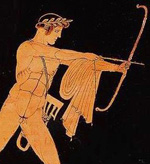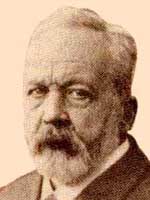Latin
Quotations N
Natura non contristatur
Nature is not compassionate [does not consider men]
derived by Schopenhauer from an earlier source
compare Dau/Dv Jing 5
Naturam expellas furca, tamen usque recurret
You may drive Nature out with your pitchfork, but she will soon return
Horace, Epistles 1/10:24
of the attempt to live amid Nature in an artificial city garden
Necesse est aut imiteris aut oderis
You must either imitate it or hate it (the way of the world)
Seneca, Epistulae Morales 7:7
The full form of the original; sometimes quoted only as "aut imiteris . . . "
Necessitas etiam timidos fortes facit
Need makes even the timid brave
Sallust, Catilina 58:19
Neque semper arcum tendit Apollo
Nor does Apollo keep his bow continually drawn
Horace, Carmina 2/10:19-20
the same image occurs in a fable of Phaedrus
Nescire autem quid ante quam natus sis acciderit, id est semper esse puerum
To know nothing of what happened before you were born is to be forever a child
Cicero, De Oratione 34/120
A rallying cry of humanists and antiquarians in later ages
Nihil enim lacrima citius arescit
Nothing dries sooner than a tear
pseudo-Cicero, Ad Herrenium 2/31:50
compare at Cito
Nihil humanum mihi alienum
Nothing human is alien to me
adapted from Terence, sometimes ending in est
for the original, see at Homo
Nihil nimis
Nothing to excess
translation of the inscription of the Temple of Apollo at Delphi
Nil admirari
To admire [covet] nothing
Horace, Epistles 1/6:1
a maxim, derived from Pythagoras, recommending happiness in frugal contentment
Nil igitur fieri de nilo posse fatendumst
Nothing, therefore, we must confess, can be made from nothing
Lucretius, De Rerum Natura 1:205
much paraphrased; for one conventional version, see at Ex
Nisi paria, non pugnant
If there are not two parties to it, there is no quarrel
Seneca, De Ira 2/34:5
Nomen amicitiae sic, quatenus expedit, haeret
The name of friendship lasts just so long as it is profitable
Petronius, Satyricon 80
treated as a matter of course, not of indignation, by Szma Tan
Non bis in idem
Not [answerable] twice in the same matter
of uncertain origin
the legal rule against double jeopardy
Non canimus surdis, respondent omnia silvae
We sing not to the deaf; the trees echo every word
Vergil, Eclogues 10:8
Francis Bacon: "The voice of nature will consent, whether the voice of man do or no"
Non est princeps super leges, sed leges supra principem
Nor is the prince above the laws; rather, the laws are above the prince
Pliny the Younger, Panegyricus 65:1
Just this proposition was also debated in classical China
Non hos quaesitum munus in usus
A gift sought for no such purpose
Vergil, Aeneid 4:647, of the sword with which Dido will commit suicide
quoted by Francis Bacon of the civil law, "not made for the countries it governeth"
Non numerantur, sed ponderantur
They are not counted, but weighed [of pieces of evidence of different value]Non omnia possumus omnes
Not everyone can do everything
Vergil, Eclogues 8:63 (and others)
Non omnis moriar
I shall not wholly die
Horace, Carmina 3/30:6
for a preceding line, see at Exegi
Non possunt primi esse omnes omni in tempore
Not everyone can occupy the first rank forever
Laberius
Non qui parum habet, set qui plus cupit, pauper est
It is not he who has little, but he who wants more, who is the pauper
Seneca, Epistulae Morales 2:6
Non sum qualis eram
I am not what I was
Horace, Carmina 4/1:3
Non sum uni angulo natus; patria mea totus hic est mundus
I was not born for any one corner; all the world is my country
Seneca, Epistles 28
Nullius addictus jurare in verba magistri
I am not bound to swear in the words of any master
Horace, Epistle 1/1:14 (to Maecenas)
The former disciple's freedom of judgement; said of Rhys Davids by Legge in 1886
Numerantur enim sententiae, non ponderantur
For the votes are counted, not weighed
Pliny the Younger, Epistulae 2/12:5
explaining why some unwise measure was adopted; compare at Ponderantur
Numero Deus impare gaudet
God likes the odd numbers [which are accordingly lucky in gambling]
Vergil, Eclogues 8:75
quoted by Julius Wellhausen, Prolegomena to the History of Ancient Israel, 231
Nunquam ponendant plurabilitas sine necessitate
A plurality [of explanations in a theory] are never to be posited without need
William of Occam (c1285-1349), Quastiones 1:27
for this principle as shaped to the liking of posterity, see at Entia
16 Feb 2007 / Contact The Project / Exit to Latin Index Page




